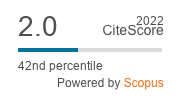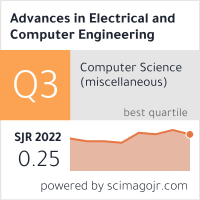| 2/2015 - 7 |
Incorporating the Avoidance Behavior to the Standard Particle Swarm Optimization 2011ALTINOZ, O. T. |
| View the paper record and citations in |
| Click to see author's profile in |
| Download PDF |
Author keywords
particle swarm optimization, social factors, cognitive informatics, performance evaluation
References keywords
swarm(14), optimization(14), systems(5), evolutionary(5), computation(5)
Blue keywords are present in both the references section and the paper title.
About this article
Date of Publication: 2015-05-31
Volume 15, Issue 2, Year 2015, On page(s): 51 - 58
ISSN: 1582-7445, e-ISSN: 1844-7600
Digital Object Identifier: 10.4316/AECE.2015.02007
Web of Science Accession Number: 000356808900007
SCOPUS ID: 84979834398
Abstract
Inspired from social and cognitive behaviors of animals living as swarms; particle swarm optimization (PSO) provides a simple but very powerful tool for researchers who are dealing with collective intelligence. The algorithm depends on modeling the very basic random behavior (i.e. exploration capability) of individuals in addition to their tendency to revisit positions of good memories (cognitive behavior) and tendency to keep an eye on and follow the majority of swarm members (social behavior). The balance among these three major behaviors is the key of success of the algorithm. On the other hand, there are other social and cognitive phenomena, which might be useful for improvement of the algorithm. In this paper, we particularly investigate avoidance from the bad behavior. We propose modifications about modeling the Standard PSO 2011 formulation, and we test performance of our proposals at each step via benchmark functions, and compare the results of the proposed algorithms with well-known algorithms. Our results show that incorporation of Social Avoidance behavior into SPSO11 improves the performance. It is also shown that in case the Social Avoidance behavior is applied in an adaptive manner at the very first iterations of the algorithm, there might be further improvements. |
| References | | | Cited By «-- Click to see who has cited this paper |
| [1] G. Beni, J. Wang, "Swarm intelligence in cellular robotic systems," NATO Advanced Workshop on Robots and Biological Systems, Tuscany, Italy, 1989.
[2] M. Dorigo, "Optimization, learning and natural algorithms (in Italian)," Ph.D. Thesis, Politecnico di Milano, Italy, 1992. [3] M. Dorigo, G. DiCaro and L.M. Gambardella, "Ant algorithms for discrete optimization," Artificial Life, vol. 5, no. 2, pp. 137-172, 1999. [CrossRef] [Web of Science Times Cited 1669] [SCOPUS Times Cited 2227] [4] J. Kennedy, R. Eberhart, "Particle swarm optimization," IEEE International Conference on Neural Networks, pp. 1942-1948, 1995. [CrossRef] [Web of Science Times Cited 31441] [5] G. Bilchev, I. C. Parmee, "The ant colony metaphor for searching continuous design spaces," AISB Workshop on Evolutionary Computation, vol. 993, pp. 25-39, 1995. [CrossRef] [SCOPUS Times Cited 284] [6] N. Monmarche, G. Venturini, M. Slimane, "On how pachycondyla apicalis ants suggest a new search algorithm," Future Generation Computer Systems, vol. 16, no. 8, pp. 937-946, 2000. [CrossRef] [Web of Science Times Cited 164] [SCOPUS Times Cited 218] [7] J. Dreo, P. Siarry, "A new ant colony algorithm using the hierarchical concept aimed at optimization of multi minima continuous functions," 3rd International Workshop on Ant Algorithms (ANTS'2002), vol. 2463, pp. 216-221, 2002. [CrossRef] [SCOPUS Times Cited 126] [8] J. Kennedy, R. C. Eberhart, "Discrete binary version of the particle swarm algorithm," IEEE International Conference on Systems, Man, and Cybernetics, pp. 4104-4108, 1997. [CrossRef] [Web of Science Times Cited 3350] [9] M. Clerc, "The swarm and the queen: towards a deterministic and adaptive particle swarm optimization," Congress on Evolutionary Computation, pp. 1951-1957, 1999. [CrossRef] [SCOPUS Times Cited 1700] [10] C. K. Mohan, B. Al-kazemi, "Discrete particle swarm optimization," Workshop on Particle Swarm Optimization, Purdue School of Engineering and Technology, Indianapolis, IN, 2001. [11] J. Robinson, Y. Rahmat-Samii, "Particle swarm optimization in electromagnetics," IEEE Transactions on Antennas and Propagation vol. 52, no. 2, pp. 397-407, 2004. [CrossRef] [Web of Science Times Cited 1556] [SCOPUS Times Cited 2050] [12] P. Poli, "Analysis of the publications on the applications of particle swarm optimization," Journal of Artificial Evolution and Applications, Article ID: 685175, 2008. [CrossRef] [13] M. Zambrano-Bigiarini, M. Clerc, R. Rojas, "Standard Particle Swarm Optimisation 2011 at CEC-2013: A baseline for future PSO improvements," IEEE Congress on Evolutionary Computation (CEC), pp. 2337 - 2344, 2013. [CrossRef] [SCOPUS Times Cited 276] [14] C. Yang, D. Simon, "A new particle swarm optimization technique," 18th International Conference on Systems Engineering, pp. 164-169, 2005. [CrossRef] [SCOPUS Times Cited 104] [15] G. Ciuprina, D. Ioan, I. Munteanu, "Use of intelligent-particle swarm optimization in electromagnetics," IEEE Transactions on Magnetics, vol. 38, no. 2, pp. 1037-1040, 2002. [CrossRef] [Web of Science Times Cited 223] [16] O.T.Altinoz, A.E.Yilmaz and G.Ciuprina, "Use of Karczmarz's method in Intelligent-Particle Swarm Optimization", International Conference on Electrical and Electronics Engineering, pp. 526-530, Bursa, 2013. [CrossRef] [SCOPUS Times Cited 2] [17] A. Biswas, A. Kumar, K.K. Mishra, "Particle Swarm Optimization with cognitive avoidance component," International Conf. on Advances in Computer, Communication and Informatics, pp. 149 - 154, 2013. [CrossRef] [SCOPUS Times Cited 11] [18] J.J. Liang, P.N. Suganthan and K. Deb, "Novel Composition Test Functions for Numerical Global Optimization," IEEE Congress on Evolutionary Computation, pp. 68-75, 2005. Matlab codes of benchmark problems: http://www.ntu.edu.sg/home/epnsugan/ index_files/SIS2005-function-codes.zip [19] F.C. Lam, M.T. Longnecker, "A modified Wilcoxon rank sum test for paired data," Biometrika, vol. 70, no. 2, pp. 510-513, 1983. [CrossRef] [SCOPUS Times Cited 76] [20] C. K. Monson and K. D. Seppi, "Exposing Origin-Seeking Bias in PSO," Genetic and Evolutionary Computation Conference GECCO, pp. 241-248, 2005. [CrossRef] [SCOPUS Times Cited 57] Web of Science® Citations for all references: 38,403 TCR SCOPUS® Citations for all references: 7,131 TCR Web of Science® Average Citations per reference: 1,829 ACR SCOPUS® Average Citations per reference: 340 ACR TCR = Total Citations for References / ACR = Average Citations per Reference We introduced in 2010 - for the first time in scientific publishing, the term "References Weight", as a quantitative indication of the quality ... Read more Citations for references updated on 2024-04-17 16:23 in 113 seconds. Note1: Web of Science® is a registered trademark of Clarivate Analytics. Note2: SCOPUS® is a registered trademark of Elsevier B.V. Disclaimer: All queries to the respective databases were made by using the DOI record of every reference (where available). Due to technical problems beyond our control, the information is not always accurate. Please use the CrossRef link to visit the respective publisher site. |
Faculty of Electrical Engineering and Computer Science
Stefan cel Mare University of Suceava, Romania
All rights reserved: Advances in Electrical and Computer Engineering is a registered trademark of the Stefan cel Mare University of Suceava. No part of this publication may be reproduced, stored in a retrieval system, photocopied, recorded or archived, without the written permission from the Editor. When authors submit their papers for publication, they agree that the copyright for their article be transferred to the Faculty of Electrical Engineering and Computer Science, Stefan cel Mare University of Suceava, Romania, if and only if the articles are accepted for publication. The copyright covers the exclusive rights to reproduce and distribute the article, including reprints and translations.
Permission for other use: The copyright owner's consent does not extend to copying for general distribution, for promotion, for creating new works, or for resale. Specific written permission must be obtained from the Editor for such copying. Direct linking to files hosted on this website is strictly prohibited.
Disclaimer: Whilst every effort is made by the publishers and editorial board to see that no inaccurate or misleading data, opinions or statements appear in this journal, they wish to make it clear that all information and opinions formulated in the articles, as well as linguistic accuracy, are the sole responsibility of the author.





